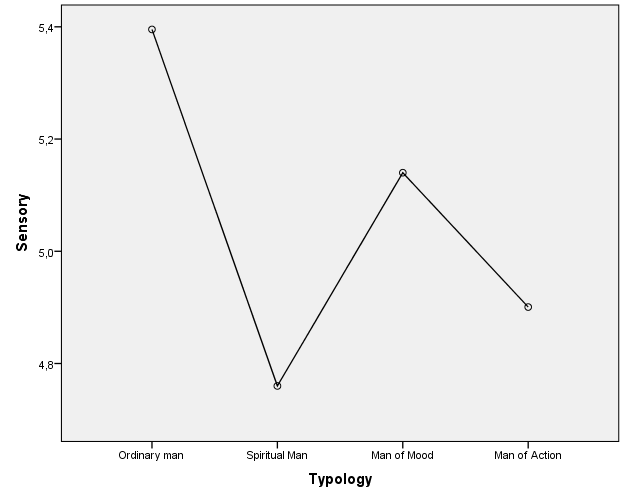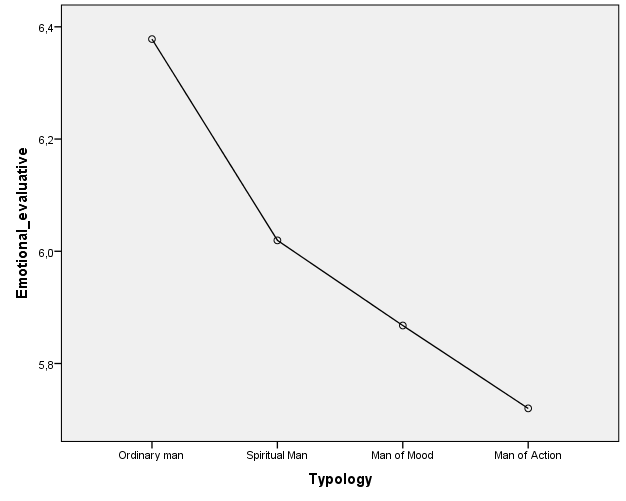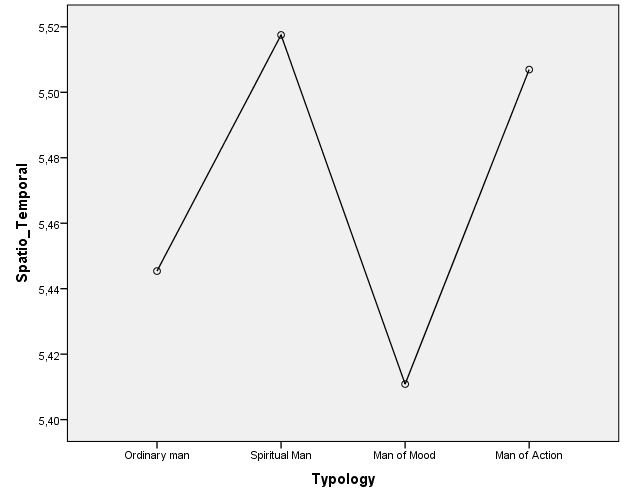Abstract
The family is one of the factors, which allow us to strengthen psychological resistance to adverse conditions. Do ideas about the family in people with different typology of individuality differ? The goal of the study was to identify the similarities and differences of the family representation in people with different typology of individuality and try to explain what caused this relationship. A multiple design was used in our research including the organization of the concept Family (directed associative experiment). IBM SPSS Statistics 22 Statistical processing techniques of empirical data included descriptive statistics and Relationships (Hierarchical Cluster Analysis, Ward’s Method). The ordinary type is characterized by a small amount of energy, but the family is “large” for them, this may be due to high rates in the sensory and emotional-evaluative index. For a person of action, it is important that his family be loved, which may be due to the fact that the space-time aspect of the family is important for this type of people. For the Spiritual Man and the Man of Mood - the emotional and evaluative characteristics of the family. Notions about Family in people with different typology of individuality differ. They are significantly associated with the characteristics of individual mental resources.
Keywords: Concept “family”temperamentcharactercognitive styles
Introduction
Studies of family and marriage are conducted in sociology, philosophy, cultural studies, psychology, and many other sciences related to society. Family is a social institution, the basic unit of society (Korolev, 2000). It belongs to the most important social values (Bim-Bad & Gavrov, 2010). Despite its general use, the concept of a family is quite extensive, and it is somewhat difficult to define it clearly. In different societies and cultures, the definition of a family may differ. In addition, often the definition also depends on the area in which this definition is given. There are many definitions of the family. Each of them depends on specific historical, ethnic, and socio-economic conditions, as well as on the specific objectives of the study (Werneck & Werneck-Rohrer, 2000; Kravchenko, 2010).
The value of the family in life remains very high due to the increase in its psychological function, since the family is one of the few factors that enhance psychological and psychophysiological resistance to adverse conditions (Volkova & Dudnikova, 2018a).
The picture of the world is changing extremely rapidly, one socio-economic formation replaces another, the virtual world displaces the real one, putting at risk the existence of the family - the most important unit of society, the last bastion responsible for the safety of mankind as a whole. It is in the family that people receive the first social experience, various skills and standards of human behaviour proper - communicative, behavioural, emotional, moral and ethical, etc. Each family is a unique system in which a person develops, finds support and realizes his own potential (Volkova & Dudnikova, 2018b).
Problem Statement
Family problems are fundamental to understanding the characteristics of personal development and social interaction. Therefore, the family is the object of studying a wide range of sciences - philosophy (Aristotle, Aquinas, Bacon, Berdyaev, Hegel, Kant, Soloviev, Engels, etc.); sociology (Antonov, Durkheim, Kohn, Navaitis, Strauss, etc.); psychology (Druzhinin, Karabanova, Shulga), economics (Vishnevsky), cultural studies and other sciences.
Therefore, it is extremely important to study the characteristics of implicit ideas about the family, allowing to identify the mechanisms of productive life in young people with different typology of individuality. The solution of this problem lies in the field of interdisciplinary research - psycholinguistics and personality psychology. Methods of personality psychology allow us to develop a typology of individuality.
An associative experiment - a technique of psycholinguistic analysis - can act as an effective way to identify implicit ideas about the family in young people with different personality traits, reveal those linguistic stereotypes that are often not realized, but control the mind and behaviour of a person, causing the productivity of vital activity provided by a set of functional, operational and regulatory mechanisms.
Functional mechanisms are a combination of innate and acquired features of the nervous system that determine the specificity of behaviour and activity (formal-dynamic properties of temperament, fundamental properties of the personality). Regulatory mechanisms are manifested in the features of the orienting actions, planning, control, correction (cognitive styles, motivation). Operational mechanisms in the context of this study represent a set of meaningful characteristics of the concept of "family" in the human mind, which determines the features of family interaction, making adjustments to the work of the first signal system through the mechanisms of second-signal control of mental processes (Chuprikova, 1967).
The concept is the basis of conceptual thinking, which is key in the structure of human mental resources. Thanks to the concepts, the situation is analyzed and causal relationships are identified, as well as the interpretation of the incident. Studies of the concept of terrorism, for example, have shown that extraverts are more active and adaptable to the environment. This fact can explain why only a few attributes of negative attitude towards terrorism in the structure of the concept. Neurotics are extremely emotional persons. Probably that is why the attribute of fear and horror dominate in the structure of the concept Terrorism. Psychotics rely only on one’s own knowledge and experience. That is why high awareness about types of terrorism and their danger correlates with a pronounced negative attitude towards terrorism. (Volkova & Dudnikova, 2018c).
Research Questions
Do ideas about the family in people with different typology of individuality differ?
Purpose of the Study
The goal of the study was to identify the similarities and differences of the family representation in people with different typology of individuality and try to explain what caused this relationship.
Research Methods
The collection of empirical data was conducted from 2015 to 2017 on a voluntary basis in compliance with generally accepted ethical norms of the organization of psychological research. To reduce the social desirability of the participants did not indicate their names, but only age and gender.
Participants
The study involved 1100 people (73% of girls). The average age of the sample was 24.46 ± 6.59.
Measures
The diagnostic complex included the research methods of the “family” concept - directed associative experiment and research methods of individual mental resources (Volkova, Rusalov, & Nilopets, 2017) - temperament, character, intelligence, cognitive styles, achievement motivation and motivation for choosing a profession.
Respondents were asked to write as many adjectives as possible on the word “family” within two minutes. Words ranked by three modalities: sensory, emotionally-evaluative, and Spatio-temporal.
It is commonly believed that an associative experiment is one of the most effective ways to study linguistic consciousness and its national-cultural specificity, since it allows us to reveal what the mental images of the world are that are inherent in representatives of one or another ethnos. In connection with what has been said, it is logical that the associative experiment is the most developed technique of psycholinguistic analysis of semantics, revealing the semantic connections of words that objectively exist in the mind of a native speaker, language stereotypes.
This article uses the typology presented in the study by Volkova and Kalugin (in press) «Typology of individuality: problems and solutions» (The authors identified the following 4 types of individuality:
1) “Ordinary Man” - psychotic, emotionally unstable, with low importance of life, spirituality, family and professional values. Such a person has no aspirations (low motivation for choosing a profession and motivation for achievements), but will have a high need for communication (high values of communicative activity), as well as increased sensitivity to any criticisms. People with this type are field dependent, intolerant and rigid.
2) “Spiritual Man” - an introvert, with high intelligence and emotional stability, as well as high indicators of vitality, meaningfulness of life and spiritual abilities. Such a person is kindhearted. He relies on his experience and easily resists the influence of other people (field independence). This type of people easily grasps the essence of the problem (abstract conceptualization). Such people are open to new experiences (tolerance) and easily switch from one cognitive function to another (flexibility of cognitive control).
3) “Man of Mood” is closed, emotionally unstable and anxious, prone to mood swings for no apparent reason, and also focused on the dark and negative sides of life. This type of people is characterized by low activity, vitality, spirituality and meaningfulness of life. People of this type do not strive for achievements, but the importance of professional activity, family values, material well-being and spiritual satisfaction are important to them. They are field dependent.
4) “Man of Action” is an extrovert, sociable, proactive, has a good mood and is able to get along with other people. Such people have high motivation for achievements, motivation for professional activity, a high level of vitality, spiritual abilities and the importance of life. People of this type have tolerance and high sensitivity to detail.
In this article we will try to understand how the characteristic composition of the concept "family" is associated with this individual psychological typology, since there has not yet been research on this topic.
Analysis
IBM SPSS Statistics 22 Statistical processing techniques of empirical data included descriptive statistics, one-dimensional analysis of variance and Relationships (Hierarchical Cluster Analysis Ward’s Method).
Findings
To identify the relationship between a different typology of individuality and the organization of the concept Family, let us turn to the results of one-dimensional analysis of variance.

Based on the Figure
An example of words related to sensory modality: strong, warm, soft.

As can be seen on the Figure
An example of words related to emotional-evaluative modality: friendly, beloved, loving.

As can be seen from the Figure
An example of words related to spatio-temporal modality: large, close, distant.
The Table
For an Ordinary man, the family should be large, which can be associated with a high need for communication, as well as the fact that this type is distinguished by high rates in sensory and emotional-evaluative modalities. It is important for them to feel the family and be included in the emotional atmosphere of the family.
For the Spiritual man, the Man of Mood and the Man of Action, the family is beloved. For them, this is the place where they love someone. It is enough for a Spiritual man, as an introvert, to simply love someone. He has the resources to maintain these feelings. A Man of Mood, characterized by low activity, in love for his family can make up for this missing resource. A Man of Mood, as an extrovert with a rich supply of resources, loves a family because he simply has one. The choice of this word by the Man of Action and the Spiritual Man can be associated with a high indicator of the spatio-temporal modality, which indicates the need for the family to always be near. It is important for a mood person to feel love for the family directly because of the high values of the sensory index.
In third place with the Ordinary man is a love of family. Perhaps for this type of people, such a position for this characteristic of the family is due to low values of the spatio-temporal modality.
A Spiritual man and a Man of Mood perceive the family as strong, which can mean mutual respect within the family, a desire to help and support, the ability to understand problems where partners are equal in rights (strong).
For the Man of Action, the family should be large, which again is connected with his sociability, ability to get along with people and a high level of spatio-temporal modality.
An Ordinary man in the last place puts such a characteristic of the family as strong because they have high sensory modality.
For the Spiritual Man and the Man of Mood, the family must be large. A Spiritual man in a large and strong family will always be involved in new activities, and will gain new experience. A Man of Mood will make up for his small amount of resources at the expense of a large family. This characteristic of the family in the last place for the Spiritual man may be due to low sensory modality, while for the Man of Mood, the same statement of the word may be associated with a low level of the spatio-temporal index.
For a Man of Action, it is important not only to love the family yourself, but also that family members love in return (loving). Feeling reciprocal love from relatives, a person with this type will satisfy his communication needs.
The Spiritual man and the Man of Mood have the same ideas about the family, despite the big difference between the two types. This may be due to approximately the same indicators of the emotional-evaluative index.
Conclusion
Family perceptions of people with different typology of individuality a differ.
An analysis of the proposed characteristics of the family revealed mainly emotional manifestations of the family (friendly, beloved, loving). Only one word refers to sensory modality: “strong”. Just as with the spatio-temporal modality, only the “large” applies.
People with different typology identify the same words, but put them in different positions, the distribution of which is affected by three modalities: sensory, emotional-evaluative, spatio-temporal.
For Ordinary man with high sensory and emotional evaluative modalities, the family is friendly, large, beloved and strong.
Spiritual man and Man of Mood have similar ideas about the family: friendly, beloved, strong, large, which may be associated with high rates of emotional-evaluative modality.
For a Man of Actions with high spatial-temporal modality are characterized by the following words: friendly, beloved, large, loving.
The choice of the word "friendly" by all types of people may be related to the age and gender characteristics of the sample.
Acknowledgments
The study was grunted by the Russian Science Foundation (Project № 18-18-00386), Institute of Psychology, Russian Academy of Sciences. The authors express gratitude to A.Yu. Kalugin, S.A. Khazova and E.I. Gorbacheva for helping in gathering the data.
References
- Bim-Bad, B. M., & Gavrov, S. N. (2010). Sem`ya kak sociokul`turnyi fenomen [Family as a sociocultural phenomenon]. Modernization of the institution of the family: macro-sociological, economic and anthropological-pedagogical analysis. Monograph (pp. 27-53). Moscow: Intellectual book, New Chronograph.
- Chuprikova, N. I. (1967). Slovo kak faktor upravleniya v vysshej nervnoj deyatel'nosti cheloveka [The word as a control factor in the higher nervous activity of a person]. Moscow: Education.
- Korolev, Yu. A. (2000). Sem`ya kak sub`ekt prava [Family as a subject of law]. Journal of Russian Law, 10, 61-66.
- Kravchenko, A. I. (2010). Glava 16: Sem`ya i brak [Chapter 16: Family and marriage]. Sotsiologiya [Sociology] (pp. 272-352). Moscow: Prospect.
- Volkova, E. V., & Dudnikova, T. A. (2018a). Features of the mechanisms of productive life activity in people with different types of personality. Bulletin of Kostroma State University. Series: Pedagogy. Psychology. Sociokinetics, 3, 39-43.
- Volkova, E. V., & Dudnikova, T. A. (2018b). Osobennosti organizacii koncepta «sem`ya» u yunoshej i devushek s raznoj tipologiej organizacii individual`nyx mental`nyx resursov [Features of the organization of the concept of "family" in boys and girls with different typologies for the organization of individual mental resources]. In A. K. Krylov, & V. D. Soloviev (Eds.), The Eighth International Conference on Cognitive Science. Abstracts of reports (pp. 1171-1174).
- Volkova, E. V., & Dudnikova, T. A. (2018c). The notions about terrorism in young people with different individual mental resources. The European Proceedings of Social & Behavioural Sciences, 56, 178-187. DOI:
- Volkova, E. V., & Kalugin, A. Yu. (in press). Typology of individuality: problems and solutions. Behavioral Sciences MDPI.
- Volkova, E. V., Rusalov, V. M., & Nilopets, M. N. (2017). An expert system for evaluation of human mental resources: Holistic and developmental approach. 2017 Intelligent Systems Conference, IntelliSys 2017.
- Werneck, H., & Werneck-Rohrer, S. (2000). Psychologie der Familie [Psychology of family]. Wien: WUV.
Copyright information

This work is licensed under a Creative Commons Attribution-NonCommercial-NoDerivatives 4.0 International License.
About this article
Publication Date
07 November 2019
Article Doi
eBook ISBN
978-1-80296-071-6
Publisher
Future Academy
Volume
72
Print ISBN (optional)
-
Edition Number
1st Edition
Pages
1-794
Subjects
Psychology, educational psychology, counseling psychology
Cite this article as:
Dudnikova, T. (2019). Family Perceptions Of People With Different Typology Of Individuality. In P. Besedová, N. Heinrichová, & J. Ondráková (Eds.), ICEEPSY 2019: Education and Educational Psychology, vol 72. European Proceedings of Social and Behavioural Sciences (pp. 568-575). Future Academy. https://doi.org/10.15405/epsbs.2019.11.66

